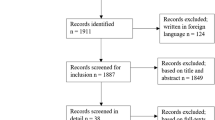Abstract
Video game playing has received increased academic interest over the last few decades, particularly with regard to the psychological understanding of addiction. Based on the many studies carried out by the authors, this paper summarises some of the methodological challenges which may arise when studying video game players, including obstacles associated with various aspects of the research population, the knowledge and attributes of the researcher, as well as external factors often out of the researcher’s control. This paper is based on the experience of conducting empirical studies of varying methodologies, including group interview, experiment and survey methods. Practical advice is also suggested, to assist researchers in building effective relationships between the research discipline and the gaming industry and community, as well as conducting their research in the most ethical, flexible, and efficient manner possible.
Similar content being viewed by others
References
Anderson, C. A., & Dill, K. E. (2000). Video games and aggressive thoughts, feelings, and behaviour in the laboratory and in life. Journal of Personality and Social Psychology, 78, 772–790.
Baumeister, R., Bratslavsky, E., Finkenauer, C., & Vohs, K. (2001). Bad is stronger than good. Review of General Psychology, 5, 323–370.
Cole, H., & Griffiths, M. D. (2007). Social interactions in massive multiplayer online role-playing gamers. CyberPsychology and Behaviour, 10, 575–583.
de Freitas, S., & Griffiths, M. D. (2008). The convergence of gaming practices with other media forms: What potential for learning? A review of the literature. Learning, Media and Technology, 33, 11–20.
Doughney, J. (2007). Lies, damned lies and ‘problem gambling’ prevalence rates: The example of Victoria, Australia. Journal of Business Systems, Governance and Ethics, 2, 41–54.
Ducheneaut, N., Yee, N., Nickell, E., & Moore, R. J. (2006). “Alone together?” Exploring the social dynamics of massively multiplayer online games. Paper presented at the human factors in computing systems CHI 2006, April 22–27, Montreal, PQ, Canada.
Fleming, A., & Kraut, R. (2007). Project Massive: Self-regulation and problematic use of online gaming. Paper presented at the CHI 2007, San Jose, CA.
Griffiths, M. D. (2000). Does Internet and computer “addiction” exist? Some case study evidence. CyberPsychology & Behavior, 3, 211–218.
Griffiths, M. D. (2005). A components model of addiction within a biopsychosocial framework. Journal of Substance Use, 10, 191–197.
Griffiths, M. D. (2008). Diagnosis and management of video game addiction. Addiction Treatment and Prevention, 12, 27–41.
Griffiths, M. D., & Hunt, N. (1998). Dependence on computer games by adolescents. Psychological Reports, 82, 475–480.
Griffiths, M. D., Davies, M. N. O., & Chappell, D. (2004). Demographic factors and playing variables in online computer gaming. CyberPsychology & Behavior, 7, 479–487.
Grüsser, S. M., Thalemann, R., & Griffiths, M. D. (2007). Excessive computer game playing: Evidence for addiction and aggression? CyberPsychology and Behaviour, 10, 290–292.
Parke, J., & Griffiths, M. D. (2002). Slot machine gamblers: Why are they so hard to study? Journal of Gambling Issues, 6. Retrieved August 31, 2007, from http://www.camh.net/egambling/issue6/opinion/index.html.
Wood, R. T. A., & Griffiths, M. D. (2002). Adolescent perceptions of the National Lottery and scratchcards: A qualitative study using group interviews. Journal of Adolescence, 25, 655–668.
Wood, R. T. A., & Griffiths, M. D. (2007). Time loss whilst playing video games: Is there a relationship to addictive behaviours? International Journal of Mental Health and Addiction, 5, 141–149.
Wood, R. T. A., Griffiths, M. D., & Eatough, V. (2004). Online data collection from video game players: Methodological issues. CyberPsychology & Behavior, 7, 511.
Wood, R. T. A., Griffiths, M. D., & Parke, A. (2007). Experiences of time loss among videogame players: An empirical study. CyberPsychology & Behavior, 10, 38–44.
Yee, N. (2005). The psychology of massively multi-user online role-playing games. In R. Schroeder & A. Axelsson (Eds.), Avatars at work and play: Collaboration and interaction in shared virtual environments. London: Springer-Verlag.
Author information
Authors and Affiliations
Corresponding author
Rights and permissions
About this article
Cite this article
King, D., Delfabbro, P. & Griffiths, M. The Psychological Study of Video Game Players: Methodological Challenges and Practical Advice. Int J Ment Health Addiction 7, 555–562 (2009). https://doi.org/10.1007/s11469-009-9198-0
Received:
Accepted:
Published:
Issue Date:
DOI: https://doi.org/10.1007/s11469-009-9198-0




